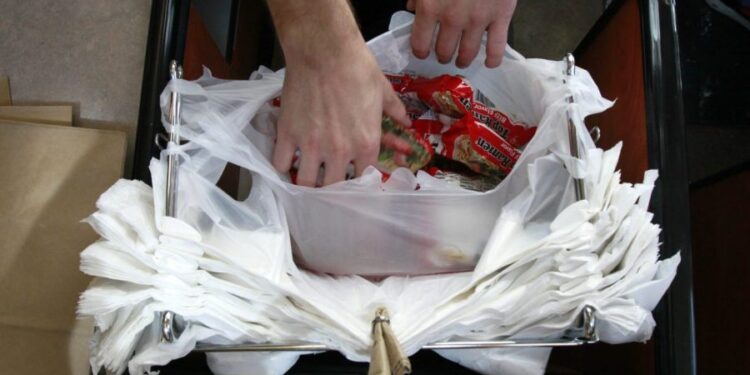
Policies aimed at curbing the use of single-use plastic bags have sometimes accomplished the opposite of their intentions, a new study has found.
When two Texas cities prohibited stores from giving away plastic grocery bags for free, the sale of such bags surged in response, according to the study, published in the Journal of Marketing Research.
The longer a policy was in place, the longer the behaviors spurred by those regulatory prohibitions persisted, the researchers found.
“We were hoping for positive spillover effects, like customers will be more environmentally conscious and consume less one-time use plastic or paper products,” Hai Che, an associate professor at University of California Riverside’s School of Business, said in a statement.
“But that’s not what happened in the data,” Che continued. “People wound up buying more plastic.”
To draw their conclusions, the researchers first quantified plastic bag sales by analyzing barcode scanner data on consumer purchases.
The Dallas City Council imposed a 5-cent fee for single-use bag purchases for five months in 2015, before manufacturer lawsuits came rolling in and the city revoked the policy, the authors noted. Once free bags became available again, sales initially plunged but ultimately returned to pre-policy levels in 13 months, according to the study.
The Austin City Council, on the other hand, had a single-use bag ban in place for five years, rather than five months: from 2013 until 2018, when the Texas Supreme Court eliminated such prohibitions statewide.
Following the repeal, plastic bag purchases fell gradually but failed to return to pre-policy levels even after 18 months — the conclusion of the study’s timeframe. The authors found that the carryover effect remained 38.6 percent above the baseline at that point.
The researchers compared these negative spillover effects to a previous study in California, which found that a nominal plastic bag fee led many consumers to grab plastic produce bags to use for other items.
Although bans on the free distribution of plastic bags may encourage some customers to increase their use of reusable bags, pack more groceries into a single-use bag or go bag-free altogether, others may resort to purchasing trash bags instead, the authors noted.
Looking at the two Texas cities specifically, the researchers conducted a “break-even analysis” to explore whether plastic bag policies were able to decrease plastic waste overall, alongside the negative effects.
To offset the extra bags purchased due to these policies, consumers would need to use one less bag for every seven grocery trips in Dallas and for every five trips in Austin, according to the study.
“Even a slight reduction in grocery bag use can offset the increased plastic consumption from trash bags,” Che said, suggesting that there may be some benefit to these policies even when they’re repealed.
Che also stressed the importance of considering the study’s findings in the context of other environmental policies, beyond plastic bag usage.
“Similar spillover effects have been documented in policies targeting sugary drinks, energy efficiency, and health incentives,” Che said.
“In each case, behaviors that weren’t directly targeted by the policy — like purchasing more sugary snacks when soda is taxed — can offset or even undermine the policy’s primary goals,” he added.






